Currently reading
Daring Greatly: How the Courage to Be Vulnerable Transforms the Way We Live, Love, Parent, and Lead
Marxist Literary Theory: A Reader
In Caddis Wood
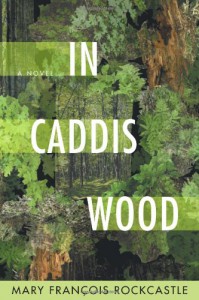 I haven't finished a book this painful in a long time. A novel with terminal illness, adultery, maternal abandonment, natural disasters, and accidental deaths can be a positive, entertaining, meaningful experience. But one where no character truly has a flaw and all interpersonal conflict can be rationalized away (I cheated because I felt ignored. See, here are all the ways I was ignored.) is dull, dull, dull.
I haven't finished a book this painful in a long time. A novel with terminal illness, adultery, maternal abandonment, natural disasters, and accidental deaths can be a positive, entertaining, meaningful experience. But one where no character truly has a flaw and all interpersonal conflict can be rationalized away (I cheated because I felt ignored. See, here are all the ways I was ignored.) is dull, dull, dull.
Friction (Mexican Literature Series)
 Because I finished this book on Bloomsday, I want to give the author credit for this massive undertaking that melds time and fuses ancient history, myths, and contemporary politics along with numerous characters from his previous novel. But most of the experiments in this book failed for me, either because they were so frustrating and annoying that I continued to read in spite of them or because they failed to maintain my interest or appreciation about a page after I figured out what he was trying to do. I only finished this book out of sheer stubbornness.
Because I finished this book on Bloomsday, I want to give the author credit for this massive undertaking that melds time and fuses ancient history, myths, and contemporary politics along with numerous characters from his previous novel. But most of the experiments in this book failed for me, either because they were so frustrating and annoying that I continued to read in spite of them or because they failed to maintain my interest or appreciation about a page after I figured out what he was trying to do. I only finished this book out of sheer stubbornness.
Good Hair
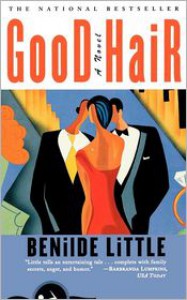 I've avoided reading chick lit novels with black protagonists because I'm sensitive to portrayals of black women as superficial, vain, and irresponsible. But I was still open to the possibility that one day, I could bear a typically white genre coupled with a tepid exploration of race (if it was deep, it probably wouldn't be chick lit) and maybe even enjoy its inevitably schizophrenic depiction of a black female professional. I'm not sure if I wasn't ready, if it's just too explosive to mix the genre with other types of people, or if this is merely a bad book. I'd forgotten that with rare exceptions I find the main character reprehensible within the first few chapters. They're never the fun, irredeemible women of say a Jean Rhys story, and I usually spend the rest of the book fantasizing about how this person could be improved. A trip to the third world? Adopting a child? Flying coach? Doing her own laundry? The problem with this book is that it does bring in weighty issues--incest, the Nation of Islam, domestic violence, suicide, an "unplanned" pregnancy to break up a relationship--and the conflicts mysteriously disappear. That illusion of depth is what frustrated me the most. Perhaps because in a story about black people, one can't have a simple love story (with two perfectly matched selfish individuals). We have to see, however quickly or tangential to the story, the brother who pulls himself up from the ghetto only to possibly go to jail, among other archetypes. The problem is that a book in which extensive descriptions of what people wear passes as character development and equal attention paid to interior decor to heighten drama shouldn't talk about, to pick a couple of topics, incest and suicide, because it's clear how out of her depth the author really is, and the inevitable absurdity isn't even comic. It's just painful.
I've avoided reading chick lit novels with black protagonists because I'm sensitive to portrayals of black women as superficial, vain, and irresponsible. But I was still open to the possibility that one day, I could bear a typically white genre coupled with a tepid exploration of race (if it was deep, it probably wouldn't be chick lit) and maybe even enjoy its inevitably schizophrenic depiction of a black female professional. I'm not sure if I wasn't ready, if it's just too explosive to mix the genre with other types of people, or if this is merely a bad book. I'd forgotten that with rare exceptions I find the main character reprehensible within the first few chapters. They're never the fun, irredeemible women of say a Jean Rhys story, and I usually spend the rest of the book fantasizing about how this person could be improved. A trip to the third world? Adopting a child? Flying coach? Doing her own laundry? The problem with this book is that it does bring in weighty issues--incest, the Nation of Islam, domestic violence, suicide, an "unplanned" pregnancy to break up a relationship--and the conflicts mysteriously disappear. That illusion of depth is what frustrated me the most. Perhaps because in a story about black people, one can't have a simple love story (with two perfectly matched selfish individuals). We have to see, however quickly or tangential to the story, the brother who pulls himself up from the ghetto only to possibly go to jail, among other archetypes. The problem is that a book in which extensive descriptions of what people wear passes as character development and equal attention paid to interior decor to heighten drama shouldn't talk about, to pick a couple of topics, incest and suicide, because it's clear how out of her depth the author really is, and the inevitable absurdity isn't even comic. It's just painful.
Under the Volcano
 If you want a rich, modernist epic that infuses cinematic forms and mythological references into a day in the life of an anti-hero but don't want to kill yourself with Ulysses, try Under the Volcano. You won't die. You'll just get headaches, in a good way.
If you want a rich, modernist epic that infuses cinematic forms and mythological references into a day in the life of an anti-hero but don't want to kill yourself with Ulysses, try Under the Volcano. You won't die. You'll just get headaches, in a good way.
In Search of Satisfaction
 I just don't think I can take a morality tale so preachy that the typesetting seems to beg for words in all caps and exclamation points. Besides, who knew that the Lord doesn't work in mysterious ways but in ironic ones?
I just don't think I can take a morality tale so preachy that the typesetting seems to beg for words in all caps and exclamation points. Besides, who knew that the Lord doesn't work in mysterious ways but in ironic ones?
Conception: A Novel
 I don't want to like this book, but it's starting to haunt me. Shivana Montgomery's world is extremely stereotypical, with such a dreary vision of Chicago's South Side in which nothing positive ever happens that I nearly stopped reading early on. It's a tale seen and heard so often that its lack of complexity in this novel just seemed offensive. Shivana lives in poverty, attends a high school where violence seems more prevalent than learning, and has only one friend. She babysits for a family that lives upstairs in her apartment building and is impregnated by the children's father, a local drug dealer. A few early slips in narration didn't help my opinion either. Since it's set in 1992, let's just say that all the dialogue is in Ebonics but the first-person narration occasionally uses words or makes observations that seem beyond Shivana's verbal capabilities.I also found the other protagonist, Shivana's fetus, who tells the stories of the three times she was nearly born before, troubling politically. It's not fair to critique the book on those terms, but it was difficult to read the tragedy of a thrice-nearly born fetus discuss the beatings in slavery, lynching, and serious depression that led to suicide that kept her in spiritual limbo without feeling like I've been set up. The very fact of her fetus's ability to tell her own story makes Shivana's deliberation over an abortion overdetermined, and the way that abortion is equated with those three other conditions makes a reader who disagrees feel trapped.But, I can't stop thinking about this book, about a young girl who alternately views the world, and especially men, with suspicion and is seduced by them all the same. As many times as her story has been told--young, uneducated, with little hope for the future, and pregnant by an absent man, this time in jail--it takes a sensitive writer to give birth to a a character whose naive mistakes seem sensible.
I don't want to like this book, but it's starting to haunt me. Shivana Montgomery's world is extremely stereotypical, with such a dreary vision of Chicago's South Side in which nothing positive ever happens that I nearly stopped reading early on. It's a tale seen and heard so often that its lack of complexity in this novel just seemed offensive. Shivana lives in poverty, attends a high school where violence seems more prevalent than learning, and has only one friend. She babysits for a family that lives upstairs in her apartment building and is impregnated by the children's father, a local drug dealer. A few early slips in narration didn't help my opinion either. Since it's set in 1992, let's just say that all the dialogue is in Ebonics but the first-person narration occasionally uses words or makes observations that seem beyond Shivana's verbal capabilities.I also found the other protagonist, Shivana's fetus, who tells the stories of the three times she was nearly born before, troubling politically. It's not fair to critique the book on those terms, but it was difficult to read the tragedy of a thrice-nearly born fetus discuss the beatings in slavery, lynching, and serious depression that led to suicide that kept her in spiritual limbo without feeling like I've been set up. The very fact of her fetus's ability to tell her own story makes Shivana's deliberation over an abortion overdetermined, and the way that abortion is equated with those three other conditions makes a reader who disagrees feel trapped.But, I can't stop thinking about this book, about a young girl who alternately views the world, and especially men, with suspicion and is seduced by them all the same. As many times as her story has been told--young, uneducated, with little hope for the future, and pregnant by an absent man, this time in jail--it takes a sensitive writer to give birth to a a character whose naive mistakes seem sensible.
The Silver Linings Playbook: A Novel
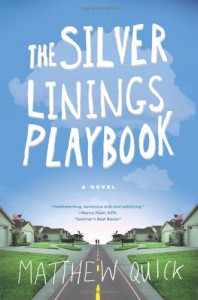 It's rare to find a first-person narrative with a naive protagonist (in this case, a person with severe mental illness and amnesia) that treats its main character with such dignity and levity.
It's rare to find a first-person narrative with a naive protagonist (in this case, a person with severe mental illness and amnesia) that treats its main character with such dignity and levity.
The Book of Hard Things
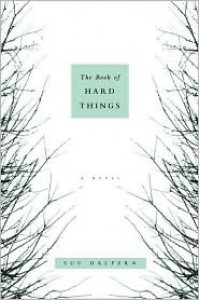 This is a paint-by-numbers tale of a small-town boy who begins to see beyond his limited horizons when he comes into contact with a worldly man, visiting his hamlet on a temporary assignment. Lousy and lazy (especially in its depiction of the rural poor), the book feels like it was written with a checklist of basic plot twists, mundane back story to provide the thinnest veneer of characterization, and obligatory self-revelations.
This is a paint-by-numbers tale of a small-town boy who begins to see beyond his limited horizons when he comes into contact with a worldly man, visiting his hamlet on a temporary assignment. Lousy and lazy (especially in its depiction of the rural poor), the book feels like it was written with a checklist of basic plot twists, mundane back story to provide the thinnest veneer of characterization, and obligatory self-revelations.
Laura Warholic: Or, the Sexual Intellectual
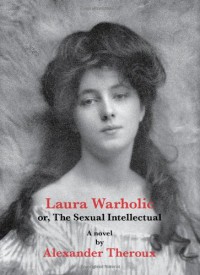 This could be a great first draft of a book if it wasn't about 500 pages too long, with about 15 more characters than it needs. Here repetition (sometimes almost entire sentences) isn't used for effect; it's the just one of several signs that the book wasn't proofread, let alone edited. Moreover, its most promising attribute, the author's fondness for puns, neologisms, and other bits of dazzling word play, not only grew old after a couple of hundred pages, but I began fantasizing of algorithms that could produce better ones (add -oidal here, convert con- to non-, etc.). It's supposed to be a satire of Generation X, but having been published in 2007, it's so late to the party that even those not invited have forgotten the snub. But, one thing I did realize from slogging through this overwrought book is the difficulty of making a successful satire, in which one character represents an entire generation. Even if one gets the details right, which Theroux doesn't, combining such an assemblage of quirks makes the individual seem beyond mentally unstable. I certainly don't expect the character not to have internal contradictions, but he or she still has to make some sense and not feel like hundreds of cultural references thrown into a blender, then onto the page. There is a good book in here, a functioning satire even, radically truncated and perhaps written entirely backward, from the perspective of Laura Warholic and not about her.
This could be a great first draft of a book if it wasn't about 500 pages too long, with about 15 more characters than it needs. Here repetition (sometimes almost entire sentences) isn't used for effect; it's the just one of several signs that the book wasn't proofread, let alone edited. Moreover, its most promising attribute, the author's fondness for puns, neologisms, and other bits of dazzling word play, not only grew old after a couple of hundred pages, but I began fantasizing of algorithms that could produce better ones (add -oidal here, convert con- to non-, etc.). It's supposed to be a satire of Generation X, but having been published in 2007, it's so late to the party that even those not invited have forgotten the snub. But, one thing I did realize from slogging through this overwrought book is the difficulty of making a successful satire, in which one character represents an entire generation. Even if one gets the details right, which Theroux doesn't, combining such an assemblage of quirks makes the individual seem beyond mentally unstable. I certainly don't expect the character not to have internal contradictions, but he or she still has to make some sense and not feel like hundreds of cultural references thrown into a blender, then onto the page. There is a good book in here, a functioning satire even, radically truncated and perhaps written entirely backward, from the perspective of Laura Warholic and not about her.
Off the Books: The Underground Economy of the Urban Poor
 If you're somewhat politically aware and concerned about urban issues, much of this book will not be new to you. It is, however, a great way to acquire better, more useful terminology as well as a conceptual framework for thinking about the entrenchment of a certain type of poverty. Plus, it's an ethnographic study, which means you get to read interesting stories. For me, the most informative sections discussed the complicated relationship between black churches, gangs, and the underground economy. I think many black progressives unfairly criticize pastors for their inability to do more organizing, and this book makes clear both the inaccurate ways that different types of preachers are lumped together as well as the historical factors that created such divisions. In fact, I felt implicated in how my family's upward mobility contributed to that schism and thus have been really unfair in my ignorant opinions. Plenty of pastors are heavily involved in grassroots efforts, and since they work in communities whose dominant forms of economic and political interactions are underground, there's no way of assessing their efforts with any degree of certainty.Lastly, for people who get upset at how the "ghetto" as an idea has been constructed, this book blows away many faulty assumptions about poor people's active, positive, intelligent engagement with their world.
If you're somewhat politically aware and concerned about urban issues, much of this book will not be new to you. It is, however, a great way to acquire better, more useful terminology as well as a conceptual framework for thinking about the entrenchment of a certain type of poverty. Plus, it's an ethnographic study, which means you get to read interesting stories. For me, the most informative sections discussed the complicated relationship between black churches, gangs, and the underground economy. I think many black progressives unfairly criticize pastors for their inability to do more organizing, and this book makes clear both the inaccurate ways that different types of preachers are lumped together as well as the historical factors that created such divisions. In fact, I felt implicated in how my family's upward mobility contributed to that schism and thus have been really unfair in my ignorant opinions. Plenty of pastors are heavily involved in grassroots efforts, and since they work in communities whose dominant forms of economic and political interactions are underground, there's no way of assessing their efforts with any degree of certainty.Lastly, for people who get upset at how the "ghetto" as an idea has been constructed, this book blows away many faulty assumptions about poor people's active, positive, intelligent engagement with their world.
A World of Gangs: Armed Young Men and Gangsta Culture (Globalization and Community)
 Overall, I found the underlying analysis comparing street gangs to other armed youth groups -- militias, child soldiers, terrorists, violent sports fans -- to be a novel and powerful way of rethinking violent cities across the globe. Plus, the histories of the Hamburg Athletic Association (a prime instigator of the 1919 race riots and whose most famous member is Richard J. Daley) and the Conservative Vice Lords should be required reading for anyone interested in Chicago's racial politics. The book fails, ironically for one written by a Chicago-based sociologist, when it talks about how the destruction of public housing changed gang life throughout the city. How one can attempt such a discussion without one mention of the Gautreaux case is stunning. But, it helps him grind his axe against a mostly white, affluent power structure and conveniently ignore community organizing when it suits him, bringing me to my next complaint. His project to humanize the people who belong to gangs is vital, and yet, when it comes to issues like gentrification, he can't seem to find a similar sort of compassion for initial "pioneers" in poor, minority neighborhoods, who, in my uninformed opinion, may have greater social status, but not necessarily higher economic status. Where are they supposed to go if they're priced out of more expensive neighborhoods whose cultures more resemble their own? In this book, they are not individual actors, but rather are a faceless current of--and recipient of--capital flows into underserved areas.
Overall, I found the underlying analysis comparing street gangs to other armed youth groups -- militias, child soldiers, terrorists, violent sports fans -- to be a novel and powerful way of rethinking violent cities across the globe. Plus, the histories of the Hamburg Athletic Association (a prime instigator of the 1919 race riots and whose most famous member is Richard J. Daley) and the Conservative Vice Lords should be required reading for anyone interested in Chicago's racial politics. The book fails, ironically for one written by a Chicago-based sociologist, when it talks about how the destruction of public housing changed gang life throughout the city. How one can attempt such a discussion without one mention of the Gautreaux case is stunning. But, it helps him grind his axe against a mostly white, affluent power structure and conveniently ignore community organizing when it suits him, bringing me to my next complaint. His project to humanize the people who belong to gangs is vital, and yet, when it comes to issues like gentrification, he can't seem to find a similar sort of compassion for initial "pioneers" in poor, minority neighborhoods, who, in my uninformed opinion, may have greater social status, but not necessarily higher economic status. Where are they supposed to go if they're priced out of more expensive neighborhoods whose cultures more resemble their own? In this book, they are not individual actors, but rather are a faceless current of--and recipient of--capital flows into underserved areas.
A Broken Mirror
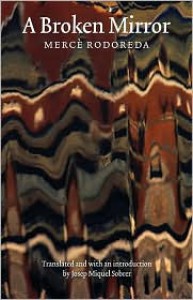 It's amazing how a really good book can strike me dumb. I can't articulate how mind-blowing this novel is. Besides being a poetic, detailed narrative about three generations living in Barcelona from the 1870s to the early Franco era, the book unfolds with an incredibly complex narrative structure. Though ordered mostly chronologically, the numerous chapters could be a series of interrelated short stories, each focusing on one of the many characters. While Rodoreda builds several, amazing lifelike figures, she is at her best in the way she litters mines throughout the narrative. After the explosions--adultery, incest, murder, sexual fetishes--I repeatedly flipped back to earlier chapters, only to reread the briefest (at one point, just 15 words) hint at what is to come. These clues, even better, are revealed from someone else's perspective, so the sharpest point of characterization arises in the most unexpected places.In addition to the play with the novel form and the engaging epic story, the book is worth reading because of its ideas about the death of youth and innocence in ways both tragic and mundane, grand and depressingly ordinary.
It's amazing how a really good book can strike me dumb. I can't articulate how mind-blowing this novel is. Besides being a poetic, detailed narrative about three generations living in Barcelona from the 1870s to the early Franco era, the book unfolds with an incredibly complex narrative structure. Though ordered mostly chronologically, the numerous chapters could be a series of interrelated short stories, each focusing on one of the many characters. While Rodoreda builds several, amazing lifelike figures, she is at her best in the way she litters mines throughout the narrative. After the explosions--adultery, incest, murder, sexual fetishes--I repeatedly flipped back to earlier chapters, only to reread the briefest (at one point, just 15 words) hint at what is to come. These clues, even better, are revealed from someone else's perspective, so the sharpest point of characterization arises in the most unexpected places.In addition to the play with the novel form and the engaging epic story, the book is worth reading because of its ideas about the death of youth and innocence in ways both tragic and mundane, grand and depressingly ordinary.








